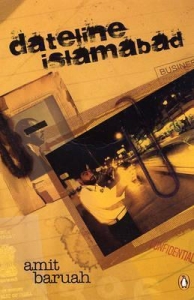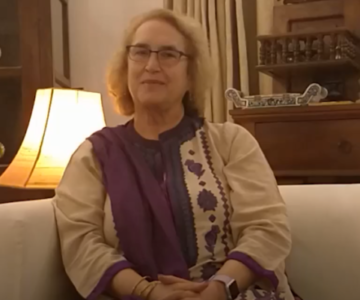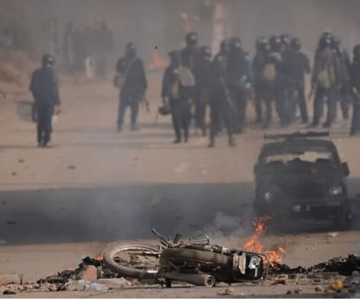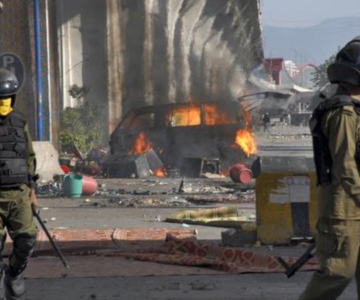From the DAWN:
AMIT Baruah is one of those Indians who have a soft corner for Pakistan and are thus genuinely interested in the improvement of relations between the two countries. He served in Islamabad from April 1997 to June 2000 as The Hindu’s special correspondent; his wife Minu is also a journalist but was not allowed to work as one from Pakistan. To this day Amit proudly tells everyone that one of his children, Antara, was born in Islamabad. At their home in New Delhi a non-stop party appears to be going on all the time as it is virtually an open house and miniature press club, where the conversation invariably touches upon developments in Pakistan.
It is thus nothing short of shocking that such a person was constantly tailed by intelligence services during his stay in the capital.
The details of this make up the Introduction and first chapter of his book titled Dateline Islamabad. Amit came to Islamabad from Delhi through Lahore on April 12, 1997. When he reached Islamabad late in the evening, in the midst of heavy rain, a lone Pakistani motorcycle-borne intelligence operative tailed his taxi cab to the hotel. The tail only ended when he left the country permanently for a posting in Singapore. The tailing presented an absurd sight for a while when the author was compelled to us a bicycle; people in Islamabad would saw the intelligence agents motorbike tailing Amit’s bicycle.
Mercifully, he soon moved into a house and bought a car. But his social contact remained limited. Few Pakistanis, friendly as they were, would openly fraternise with him. In their place, Amit says, I too, would have stayed away from Indians. Who wanted to be asked uncomfortable questions, visited at home and in the office by interrogators? Still, it goes to the credit of the intelligence agents that Amit and his family did not have a single unpleasant experience. In fact, he recalls the time he had to take his daughter to the PIMS Hospital; he was speaking to the doctors inside the casualty wing when the intelligence men barged in to ask: `Kya hua? Baby theek to hai? After his return from India following Minus fathers death, the doorbell rang. Outside stood one of Amits regular minders. I’m very sorry about your father-in-law passing away, the man called out, I came only to pay my condolences. The book narrates many such experiences which only go to show its writer’s objectivity.
Pakistan may or may not be an investors paradise but it is definitely regarded as a paradise by journalists from all over the world. Many western countries and the United Nations pay their expatriate employees hardship allowances for being posted in Pakistan, but journalists love it here for there is never a dull moment. Amit’s tenure was no exception. He came to the country along with Nawaz Sharif’s heavy mandate. He does not conceal his perception of PM Sharif as having severe autocratic tendencies and talks in detail about the PM’s protracted confrontation with the Chief Justice Sajjad Ali Shah and President Leghari, which led to the downfall of both but not before a sad attack on the Supreme Court itself in November 1997.
One chapter is devoted to Nawaz Sharif’s getting the Chief of Army Staff Jehangir Karamat to resign and appointing General Pervez Musharraf in his place. While another chapter deals with India and Pakistan going nuclear in May 1998. Amit witnessed the Indian Premier Vajpayee coming to Lahore on his historic sojourn during which he visited the Minar-i-Pakistan where the Pakistan Resolution was passed.
Many books have been written about the Kargil imbroglio but Amit’s chapters in Dateline Islamabad are the first ones written from the perspective of an Indian sitting in Pakistan. He saw the Pakistani troops climbing the PTV (Pakistan Television) Gate in Islamabad which signalled the downfall of a civilian government and which baffled him no end. There was no public resistance. Once more, Pakistan passed peacefully from civilian to military rule. On December 24, 1999, Indian Airlines flight IC-814 was hijacked from Kathmandu and then taken to Amritsar and finally Kandahar. The Pakistani authorities did not allow Amit to go to Afghanistan to cover the episode which lasted for a week; he laments this denial of opportunity. He left Pakistan within seven months of Musharraf taking over. Despite this, however, he covered the Agra Summit that took place in August 2000, the events of 9/11 and the major U-turn Pakistan made following it. Amit asks can Musharaf reverse the Zia legacy?and has written the last chapter with an eye on the future of India and Pakistan.
The book is written in a reader-friendly manner and will be fun to read for anyone who has witnessed the events in question, or who at least is interested in the topics under discussion. It is hard to tell even after one has finished the book as to whose side Amit is on. I know for a fact, as we used to have extensive discussions during the Kargil War, that he was critical of the knickerwalas as he is fond of calling the BJP and the RSS. During the crisis I had thought that India may hit Pakistan with a few missiles after the Pakistanis felled two Indian planes. Amit though rightly predicted that the BJP would not have the nerve and that they would simply make a hue and cry over the incident. He is not a Congress fan either, but I found him celebrating at his home with friends when I called him in Delhi following the defeat of the BJP in the last Indian elections.
Amit was probably keeping a diary during his stay in Pakistan because he mentions many things that we discussed, but I would be surprised if anybody could remember so many of them without noting them down. The book is not one that is based on extensive research but each chapter has a few notes clubbed together at the end of the book. It is one which is based on memory, newspaper clippings, a short chronology, and few documents. Despite this, I could not find a single factual error in the entire 270-page book, including the pages of notes at the end, which is nothing short of marvelous and the author can take pride in this.
The author argues that the Indian Airlines hijacking could have been handled in a more appropriate fashion, and accuses the BJP government of a delayed response. He also points a finger at it for intelligence failure when it came to Kargil. He obviously blames Musharraf for destroying the spirit festered by Vajpayee Lahore trip, but says that it could not have been planned without PM Sharif being at least somewhat in the picture. He believes that Sharif was informed in general terms about some action to be taken but not about its specifics. The army had decided how to tell Sharif and how much to withhold from him. In any event, the PM was comfortable with the fact that he had installed his own man as army chief, and did not think that Musharraf would do anything as audacious as undermine the India-friendly policy set in motion by Pakistan’s most powerful civilian PM. Amit alleges that the Indians were let down by the invasion as it showed that following the Lahore trip, `the winds of change were blowing, but they were blowing from India to Pakistan and not back. This is truly sad. The two chapters on Kargil are some of the best in the book and go to show, to quote Amit, that Kargil was a diplomatic disaster of epic proportions for Pakistan. It exposed the state as a liar. Meanwhile the restraint shown by India earned it considerable respect abroad; it demonstrated that India was acting with moderation in the face of extreme provocation from Pakistan.
The book concludes with an analysis of the growing Talibanisation in Pakistan. The tragedy is that a foreign journalist is able to so succinctly and correctly analyse the problems — even indirectly propose a solution — after living in the country for only three years, while our ruling class is so busy exploiting the national resources that it remains clueless with regards to a solution. Clearly they could not care less.

Dateline Islamabad
By Amit Baruah
Penguin Books, India. Available with Liberty Books, Karachi
ISBN 0-14-310246-X
270pp. Rs495



